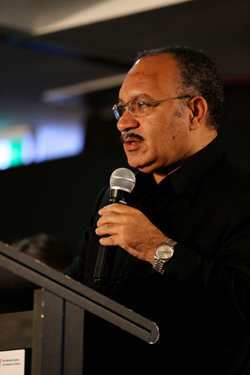The Papua New Guinea Government has acknowledged the need for action to deal with a worsening Budget deficit, blaming lower global commodity prices, with the Prime Minister flagging cuts to government expenditure.

PNG Prime Minister, Peter O’Neill
Last week, PNG’s Treasury released its Mid Year Economic and Fiscal Outlook (MYEFO) report, which revealed the government deficit is set to increase this calendar year from an expected 4.4% of GDP, to 9.4%.
Public debt is also projected to soar from a forecast 27.8% of GDP to 41.3%, said the Treasury report, adding ‘the updated MYEFO estimate is, however, expected to increase to 41.3% of GDP, which is 6.3% higher than the legislated debt limit.’
Resilience
Prime Minister Peter O’Neill blamed low commodity prices for the deficit blowout. He told local media: ‘The downturn in commodity prices has affected our budget bottom line this year–but our economy is proving resilient and can absorb these shocks.’
He added that GDP growth was expected to remain around 11%, saying: ‘Our inflation remains very stable at around 4% and our foreign exchange reserves are stable, covering almost nine months of increase.
‘That is higher than many parts of the world where usually many import cover is only around three months. Our foreign exchange rates with our trading partners are very stable.’
O’Neill said spending cuts would be needed because of reduced revenue and government departments would be asked to suggest areas for savings.
The Treasury report acknowledged ‘the deterioration of the Government Fiscal Balance as a result of lower than expected revenue due to low commodity prices’, but has also warned an expenditure cut exercise ‘may be insufficient to fully compensate for this.’
‘But what is really surprising is the fall in non-resource revenues,’ noted former PNG Treasury adviser, Paul Flanagan, who blames falling commodity prices, a slowdown in growth and the sales of state assets not proceeding.
‘There are also now major falls predicted relative to budget in GST revenues (K400 million), personal income tax (K125 million), company tax (K124 million) and excise (K66 million): all of these are now estimated at 2014 levels or below.’
Supplementary budget?
The ABC reports a supplementary budget is expected to be introduced before Parliament resumes on October 26. Last week, Treasurer Patrick Pruaitch announced that the government ‘has and will continue to review its position including handing down an Appropriations Reduction Bill in 2015.’
‘Cuts will be made to non-priority areas where projects that can be deferred to next year and the following year,’ said Prime Minister O’Neill this week.
‘But there will be no cuts to key priority areas that affect thousands and thousands of families and individuals. Health, education, law and order and infrastructure are too important and there will be no cuts in these priority areas. We are reviewing all ongoing Government expenditure and identifying waste.’








Speak Your Mind